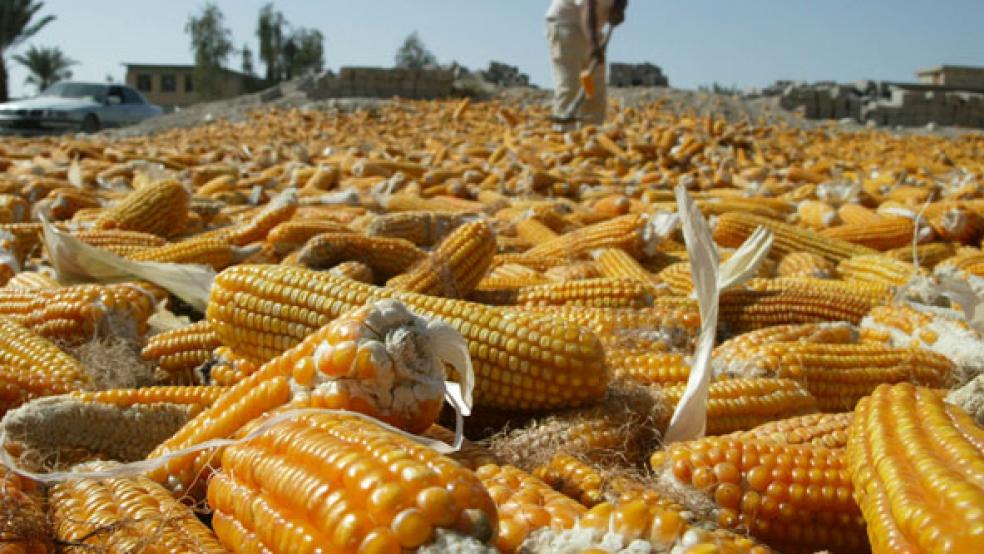The price of oil, corn, wheat, copper, gold, and silver have all hit the skids in recent weeks.
There’s been some bounce back in the past few days, but the downturn for these commodities suggests the start of a global slowdown. Growth in China has started to disappoint. Europe remains in a perpetual state of financial havoc. On Tuesday, both regions posted weak manufacturing numbers for the April Purchasing Managers Index.
The International Monetary Fund confirmed the trend last week with their latest economic projections. It knocked its global growth estimates by two-tenths of a point to 3.3 percent and shaved its U.S. forecast by the same amount to 1.9 percent.

Sluggish growth worldwide is the one big economic worry that Capitol Hill has yet to talk about much. That’s because prices fell.
Congress usually only concerns itself with commodity prices when the cost surges. Hearings are held about the role of speculators in the energy markets. And in recent years, President Obama has twice touted the formation of a special commission to investigate the manipulation of petroleum prices, only to have the task force quickly fade from public view.
“I always thought the first sign of spring was a congressional investigation on gasoline prices,” said Phil Flynn, senior energy analyst at the Price Futures Group.
Here’s what commodity prices mean for the U.S. economy going forward, the good, the bad, and the ugly:
Lower Gasoline Prices! – There’s an upside to an ailing global economy. The AAA Daily Fuel Gauge Report says that a gallon of gasoline costs $3.52, 33 cents cheaper than a year ago.
This provides some relief for families that no longer have the benefit of the payroll tax holiday. That tax break expired at the start of the year after pumping up annual paychecks on average by $1,000 for each of the past two years.
But even this could be a mixed blessing. When an economy has to choose between strong growth and lower commodity prices, it’s better to go with growth.
“If gasoline prices are dropping because of a weaker U.S. economy and outlook, the lack of new jobs and continued high unemployment could quickly wipe out the potential benefits for the consumer,” said Scott Anderson, chief economist for the Bank of the West.
We Never Fixed The Global Financial Crisis – The worldwide economy has been on life support for the past few years, even if the United States has been undergoing a slow recovery.
“We haven’t really solved the financial crisis from before,” Flynn said. “We’ve been hiding a lot of the problems behind stimulus and printed money. And in some cases, while it stopped the economy from going off the cliff, we still have a failure to launch.”
What makes the situation different this time is that China and Brazil—two developing economies that powered the rebound after 2008—have started to sputter. Meanwhile, the debt woes in Greece, Italy and Spain have infected the heart of Europe, with PMI data indicating that France and Germany are struggling to modest growth.
“We don’t have a sense of the final destination,” the IMF’s chief economist Olivier Blanchard said at a conference last week, as recounted by The New York Times. “Where we end I really don’t have much of a clue.”
OPEC Appears Weakened – Remember in the 1970s how the economy once depended on the whims of the Organization of the Petroleum Exporting Companies? This 12-nation cartel meets in May, where it may decide to cut production in order to boost prices.
But pulling on the strings of the market is no longer as easy. Canada now has additional reserves because of the tar sands, while the United States and China both have petroleum choices because of technological improvements that make shale oil viable.
Petroleum may have become a buyers’ market, instead of one for sellers.
“The question is, do they really have the mojo they use to have?” said Flynn. “With the new production techniques, they’re no longer the only game in town.”
The Fed Might Try to Rescue the Economy (Again) – Falling commodity prices create the possibility of lower inflation levels, if not deflation.
The Federal Reserve’s mission is to stabilize prices—usually at a long-term inflation target of 2 percent. So a drastic enough worldwide slowdown means that Fed Chairman Ben Bernanke could maximize his flexibility by expanding his third round of quantitative easing—a policy that puts money into the economy through the purchase of financial assets such as Treasury bonds or mortgage-backed securities.
Anderson, at the Bank of the West, said such a move would put a floor on commodity prices and help out equities, but “little of this increased wealth is finding its way back into the general economy.”
Gold Is Not A Perfect Substitute For Money – The crash in gold prices upset the devotees of former Republican presidential candidate Ron Paul, whose push for a metal-backed currency gained popularity.
Investors flocked into gold, assuming that it would be a hedge against the possibility of inflation from the Fed pushing more money into the ailing economy. It turns out that gold is a commodity.
David Kotok, chairman of Cumberland Advisors, put the situation into context with a client note last week, noting that gold is an investment to store value from long-term fluctuations.
“It is not money in the traditional sense of a currency in which transactions can be made,” Kotok wrote. “It does not facilitate payments. It is not a unit of account. We do not print financial statements in terms of ounces or tons of gold. Instead, we use currencies to measure our financial status.”




